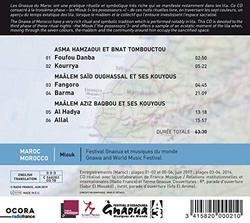| All Artists: Asma Hamzaoui Title: Morocco - Mlouk, Gnawa & World Music Festival Members Wishing: 0 Total Copies: 0 Label: Ocora Radio France Release Date: 6/14/2019 Genres: International Music, Latin Music Styles: Africa, Morocco Number of Discs: 1 SwapaCD Credits: 1 |
Search - Asma Hamzaoui :: Morocco - Mlouk, Gnawa & World Music Festival
 | Asma Hamzaoui Morocco - Mlouk, Gnawa & World Music Festival Genres: International Music, Latin Music Since the end of the 19th century, the search to identify the origin of the Gnawa community and its ritual practices relied on a loose phonetic premise found in research devoted to the cult of North African saints and the ... more » |
Larger Image |
CD Details
Synopsis
Product Description
Since the end of the 19th century, the search to identify the origin of the Gnawa community and its ritual practices relied on a loose phonetic premise found in research devoted to the cult of North African saints and the slave trade in Islamic regions. Maurice Delafosse (1870-1926) had speculated that the Berber expression akal-n-iguinaouen (land of the Blacks) could have given rise to the words Guinea and Gnawa by phonetic similarity and that Gnawa could therefore mean a black person, or someone from the land of the Blacks. In the absence of conclusive historical data, this phonetic relationship gave rise to the hypothetical Sub-Saharan origin of the Gnawa and their rituals. Contemporary researchers now admit that identifying the origin of this people from a word is unreasonable today, especially since the Gnawa of Morocco are not all black, Arab or Muslim. They also co-exist in Berber and Jewish communities. According to new evidence, the Gnawa have been Moroccan for generations and are not all descendants of slaves. The Gnawa of Morocco have a very rich ritual and symbolic tradition which is performed notably in lila. This album is devoted to the third phase of these ritual nights the Mlouk (the possessors) and offers a sample of an ecstatic moment of the lila when, moving through the seven colours, the maâlem and the community around him occupy the sanctified space.
